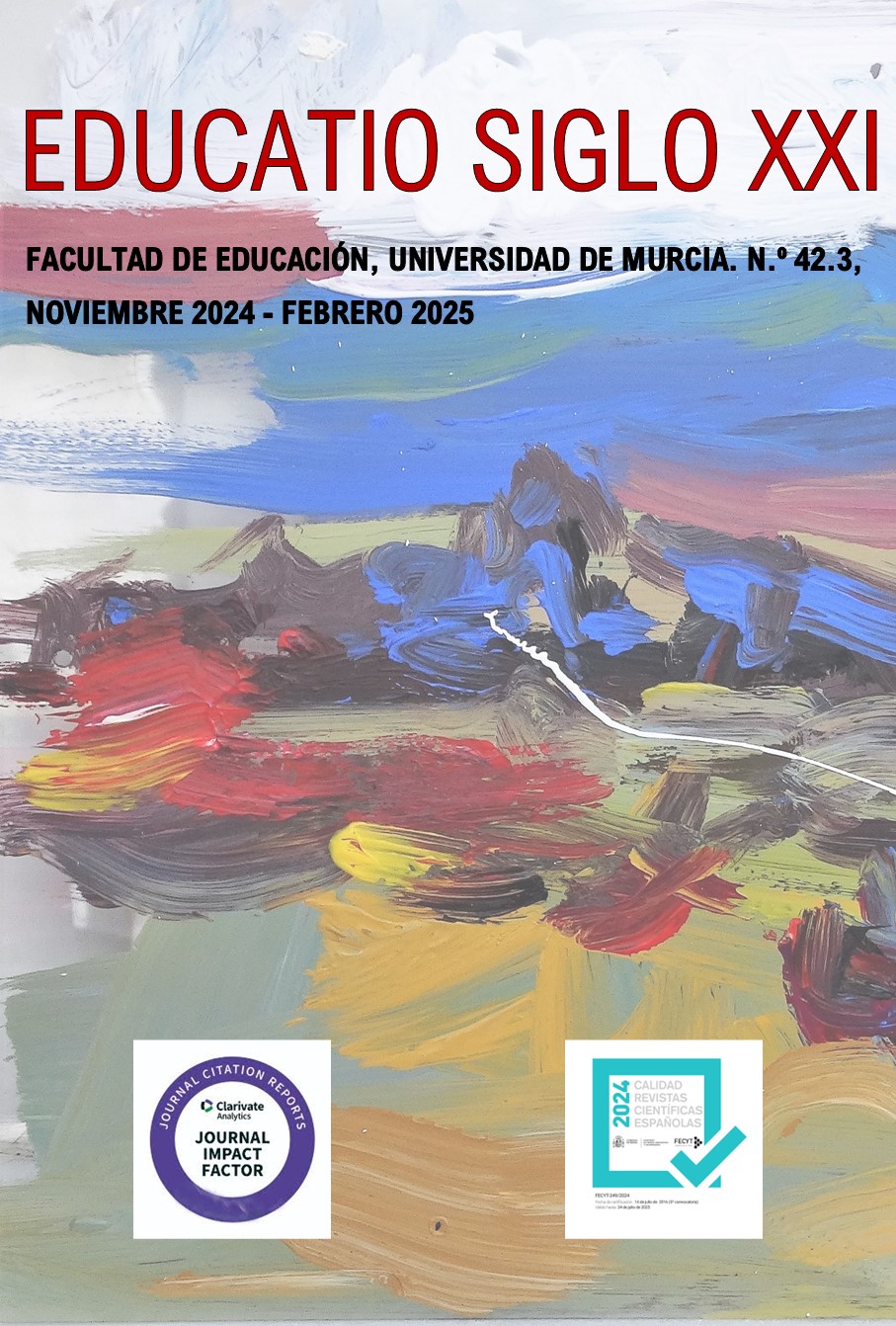Alternative schools in the Region of Murcia: principals’ and teachers’ views
Abstract
The rise of the well-known “alternative pedagogies”, the post-pandemic reality, and the recent changes in educational regulations support the guiding principles
of this study. Its aim is to describe the reality of alternative schools in the Region of Murcia by exploring the view of the principals and the teachers of these schools. Information was collected from 11 alternative schools through semi-structured interviews reporting on the main foundations of these schools, their benefits and limitations, their physical structure, school-family relations, and their pedagogical proposals. The results reveal that, at present, the Region of Murcia has a wide range of alternative pedagogical proposals: free pedagogy centers, Montessori centers and a Waldorf pedagogy center. Regarding their teaching models, it is evident that they follow the precepts and proposals put forward by the authors of reference in the field of Education in the 20th century. This finding could be a starting point to analyze the reality of schools in this autonomous community and in the rest of Spain in relation to the regulatory changes that have recently taken place. A multidimensional analysis involving teachers, family, and governments would provide further evidence of the benefits for children when they enjoy a living and experiential form of education which is linked to their interests and needs.
Downloads
-
Abstract497
-
PDF (Español (España))231
References
Braun, V., & Clarke, V. (2021). Can I use TA? Should I use TA? Should I not use TA? Comparing reflexive thematic analysis and other pattern-based qualitative analytic approaches. Counselling and Psychotherapy Research, 21(1), 37-47. https://doi.org/10.1002/capr.12360
Calatayud, M. A. (2018). Los agrupamientos escolares a debate. Tendencias Pedagógicas, 32, 5-14. doi: 10.15366/tp2018.32.001
Carbonell, J. (2015). Pedagogías del siglo XXI. Alternativas para la innovación educativa. Octaedro.
Creswell, J. W., & Plano Clark, V. L. (2018). Designing and conducting mixed methods research (3rd. ed.). Sage.
Conley, B. E. (2002). Alternative schools: A reference handbook. Abc-clio.
Contreras, J. (2010). Otras escuelas otra educación, otra forma de pensar en el currículum. Revista Educación XXI, 4, 548-566.
Goran, A. J. (2019). Exploration of successful alternate schools. Doctoral dissertation. Vancouver Island University. Recuperado de https://viurrspace.ca/bitstream/handle/10613/22204/Goran.pdf?sequence=1&isAllowed=y
De Zubiría, J. (2006). Los modelos pedagógicos: hacia una pedagogía dialogante. Coop. Editorial Magisterio.
Díaz Bajo, M.P. (2019). Panorama actual de las pedagogías alternativas en España. Papeles Salmantinos de Educación, 23, 247-281. Recuperado de https://revistas.upsa.es/index.php/papeleseducacion/article/view/30
Friese, S. (2019). Qualitative Data Analysis with ATLAS.ti. Sage.
Fullan, M., y Langworthy, M. (2014). A rich seam: How new pedagogies find deep learning. Pearson.
García, A. (2017). Otra educación ya es posible: una introducción a las pedagogías alternativas. Litera.
Hernández, R., Fernández, C. y Baptista, M.P. (2010). Metodología de la investigación (6ª edición). McGrawHill.
Hoffman, J. (2002). Flexible grouping strategies in the multiage classroom. Theory into practice, 41(1), 47-52.
Kvale, S. (2011). Las entrevistas en investigación cualitativa. Madrid: Editorial Morata.
Latorre, A., Del Rincón, D. y Arnal, J. (2003). Bases metodológicas de la investigación educativa. Ediciones Experiencia.
Montessori, M. (1913). Il metodo della pedagogia scientifica applicato all'educazione infantile nelle case dei bambini. Opera Nazionale Montessori.
Morales Valero, M., y Amber Montes, D. (2021). Implicaciones pedagógicas y organizativas de un proyecto de educación alternativo para la etapa de Educación Infantil en España. Educatio Siglo XXI, 39(3), 109–134. https://doi.org/10.6018/educatio.423891
Pericacho, F.J. y Andrés-Candelas, M. (2018). Actualidad de la renovación pedagógica en la Comunidad de Madrid: un estudio a través de centros escolares representativos. Educação e Pesquisa, 44, 1-18. Recuperado de https://www.scielo.br/j/ep/a/pC75DFMTXrmhX9gy8ZLGPLv/?format=pdf&lang=es
Roberts, K., Dowell, A., y Nie, J. B. (2019). Attempting rigour and replicability in thematic analysis of qualitative research data; a case study of codebook development. BMC Medical Research Methodology, 19. https://doi.org/10.1186/s12874-019-0707-y
Sim, S. P. L., Sim, H. P. K., y Quah, C. S. (2021). Online learning: A post COVID-19 alternative pedagogy for university students. Asian Journal of University Education, 16(4), 137-151.
Simons, H. (2011). El estudio de caso. Teoría y práctica. Morata
Torres, J. A., y Fernández, J. M. (2015). Promoviendo escuelas inclusivas: análisis de las percepciones y necesidades del profesorado desde una perspectiva organizativa, curricular y de desarrollo profesional. Revista Electrónica Interuniversitaria de Formación del Profesorado, 18(1), 177–200. https://doi.org/10.6018/reifop.18.1.214391
Tyack, D., y Tobin, W. (1994). The grammar of schooling: why has it been so hard to change? American Educational Research Journal, XXXI, 435-479.
Vallejo, M., y Torres-Soto, A. (2020). Concepciones docentes sobre la calidad de los procesos de enseñanza y aprendizaje de la educación preescolar. Revista Electrónica Educare, 24(3), 274-293.
Wagnon, S. (2021). Las pedagogías alternativas. Montessori, Freinet, Decroly, Steiner y otras corrientes que revolucionaron la educación. Plataforma.
Yin, R.K. (2018). Investigación y aplicaciones de estudios de casos: diseño y métodos (sexta ed.). SAGE.
Copyright (c) 2024 Servicio de Publicaciones de la Universidad de Murcia

This work is licensed under a Creative Commons Attribution-NonCommercial-NoDerivatives 4.0 International License.
Original work publishes in this journal is subject to the following terms:
1. Murcia University Press (the publishing house) holds the copyright of the publishes work, and favours and allows their reutilization under the use license stated in point 2.
© Servicio de Publicaciones, Universidad de Murcia, 2015
2. Work is published in the electronic edition under a license (Creative Commons Reconocimiento-NoComercial-SinObraDerivada 4.0 España (legal text). They can be copied, used, disseminated, transmitted and publicly presented, as long as: i) authorship and original publication source is acknowledged (journal, publishing house and URL of the work); ii) are not used for commercial purposes; iii) the existence and specifications of this use license is stated.
3. Conditions for self-archive. Authors are allowed and encouraged to disseminate electronically the pre-pint (before review) and/or post-print (accepted for publication) versions of their work before their publication since that favours earlier circulation and dissemination resulting in an increased chance for the authors to be cited and for the work to reach a bigger share of the academic community. Colour: RoMEO: green.








